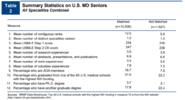- Joined
- Sep 12, 2021
- Messages
- 142
- Reaction score
- 210
This thread is partly for me, but also for people in other T30s who are P/F. And like most threads I make here, it's because I feel there are things I am missing. My school is P/F with no internal rankings for pre-clinical, AOA is determined by STEP performance and clerkships. So I have an idea of where I'll need to focus, but how about for others?
Do people at these True P/F schools feel they have more freedom to do other things because they didn't have to spend as much time on their studies?
Looking at ( match data for last year ) the biggest difference between matched and unmatched applicants is STEP scores and AOA membership. Everything else is the same: research experiences, abstracts, presentations, publications, work experiences, volunteer experiences.
There are a lot of people talking about the Pro's of P/F schools and STEP 1 changes all over the internet and in student Q&A's, but what I'm seeing isn't really as rose tinted. I'm going to a T30, but it's not Mayo. If my entire curriculum was P/F the only way I'd have to stand out is through ECs and STEP 2 scores, or through the schools own prestige.. at that works if you're at Mayo, but not really for me. Beyond that I've been told STEP 1 was a bigger determining factor than STEP 2 for a reason.. AOA, STEP 1, STEP 2, all big factors, but if you are in one of those schools, you don't get to take part in 2 of those 3 now that STEP 1 is P/F.
As for me, I don't really know what I want to do yet.. I have some ideas, but if I wanted to do a competitive specialty this AOA membership seems to mean even more. For Derm it's 47% of matched people, and it's over 40% for plastic surgery, ENT, and Ortho as well if I remember correctly. The obvious answer seems to be "focus on STEP 2" or pump up those research experiences, but again I've seen an overall trend that the higher ranked schools do tend to have more research opportunities for students, which further pushes lower ranked schools into this weird position where I see people discussing how happy they are about the curriculum going P/F which I can certainly understand from a students perspective.. but looking forward it seems like it could actually be a detriment.
Perhaps last years data isn't as important for what I am getting at so much as the next few years data will be in showing how these trends change? Is anyone already seeing trends change from the inside?
Do people at these True P/F schools feel they have more freedom to do other things because they didn't have to spend as much time on their studies?
Looking at ( match data for last year ) the biggest difference between matched and unmatched applicants is STEP scores and AOA membership. Everything else is the same: research experiences, abstracts, presentations, publications, work experiences, volunteer experiences.
There are a lot of people talking about the Pro's of P/F schools and STEP 1 changes all over the internet and in student Q&A's, but what I'm seeing isn't really as rose tinted. I'm going to a T30, but it's not Mayo. If my entire curriculum was P/F the only way I'd have to stand out is through ECs and STEP 2 scores, or through the schools own prestige.. at that works if you're at Mayo, but not really for me. Beyond that I've been told STEP 1 was a bigger determining factor than STEP 2 for a reason.. AOA, STEP 1, STEP 2, all big factors, but if you are in one of those schools, you don't get to take part in 2 of those 3 now that STEP 1 is P/F.
As for me, I don't really know what I want to do yet.. I have some ideas, but if I wanted to do a competitive specialty this AOA membership seems to mean even more. For Derm it's 47% of matched people, and it's over 40% for plastic surgery, ENT, and Ortho as well if I remember correctly. The obvious answer seems to be "focus on STEP 2" or pump up those research experiences, but again I've seen an overall trend that the higher ranked schools do tend to have more research opportunities for students, which further pushes lower ranked schools into this weird position where I see people discussing how happy they are about the curriculum going P/F which I can certainly understand from a students perspective.. but looking forward it seems like it could actually be a detriment.
Perhaps last years data isn't as important for what I am getting at so much as the next few years data will be in showing how these trends change? Is anyone already seeing trends change from the inside?

